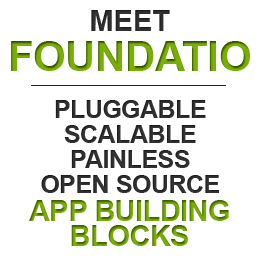
We tried an open source Redis cache client for caching, but it went commercial (expensive) and there wasn't any in-memory implementations. For the message bus, we looked at NServiceBus (good product, high cost, not open source friendly) and MassTransit (local setup a pain, Azure support lacking), but were left disappointed. For storage, we simply could not find a solution that was decoupled and supported in memory, file storage, or Azure Blog Storage.
So, naturally, we built our own!
Meet Foundatio - your key to painless, scalable development and testing for your app! Let's take a look at some examples, below.
Using Foundatio
To start using Foundatio for your project, simply get the appropriate package from NuGet.
Below are small examples of what is possible with Foundatio caching, queues, locks, messaging, jobs, file storage, and metrics. We hope you find these explanations and samples useful, but please let us know if you have any questions or comments.
Caching
Foundatio provides four cache implementations, all derived from the ICacheClient interface, that save you expensive operations when creating or getting data by allowing you to store and access the data super fast.
These implementations include InMemoryCacheClient, HybridCacheClient, RedisCacheClient, and RedisHybridCacheClient. Learn more about each in the Foundatio Readme Caching section.
For Exceptionless, we use RedisHybridCacheClient to cache users, organizations, and projects, which has a huge performance boost since we don't have to serialize the item if it's in local memory cache.
Foundatio Caching Sample
using Foundatio.Caching;
ICacheClient cache = new InMemoryCacheClient();
cache.Set("test", 1);
var value = cache.Get<int>("test");Queues
Foundatio includes three queue implementations, each derived from the IQueue interface, for First In, First Out (FIFO) message delivery. These include InMemoryQueue, RedisQueue, and ServiceBusQueue. Read more in the queues section of the readme.
We use queues, along with Foundatio Storage (below) to queue events for Exceptionless. Using both allows us to keep payloads small and limit system load.
Foundatio Queue Example
using Foundatio.Queues;
IQueue queue = new InMemoryQueue();
queue.Enqueue(new SimpleWorkItem {
Data = "Hello"
});
var workItem = queue.Dequeue(TimeSpan.Zero);Locks
To ensure any resource is only accessed by one consumer at any one time, use one of the two Foundatio Locks implementations, each derived from the ILockProvider interface. These implementations include CacheLockProvider and ThrottlingLockProvider. These providers take an ICacheClient, ensuring code locks across machines. Read more on the repo.
We use locks to only run single instances of jobs (below), and more.
Foundatio Locks Sample
using Foundatio.Lock;
ILockProvider locker = new CacheLockProvider(new InMemoryCacheClient());
using (locker) {
locker.ReleaseLock("test");
using (locker.AcquireLock("test", acquireTimeout: TimeSpan.FromSeconds(1))) {
// ...
}
}Messaging
Derived from the IMessageBus interface, our three message bus implementations let you publish and subscribe to messages within your application. Use the InMemoryMessageBus, RedisMessageBus,or ServiceBusMessageBus implementations based on your needs. Read more about each implementation on GitHub.
Exceptionless utilizes the message bus extensively to pass messages such as events being created, stacks being changed, etc, throughout the system.
Foundatio Messaging Example
using Foundatio.Messaging;
IMessageBus messageBus = new InMemoryMessageBus();
using (messageBus) {
messageBus.Subscribe<SimpleMessageA>(msg => {
// Got message
});
messageBus.Publish(new SimpleMessageA {
Data = "Hello"
});
}Jobs
Run jobs by calling Run() or passing it to the JobRunner class, which allows you to easily run jobs as Azure Web Jobs. All jobs are required to derive from the JobBase class.
Around here, we use the jobs feature for processing events, sending mail messages, and more. Some jobs, such as our DailySummaryJob, which we only want to run once, also use locks (above) to only run one instance.
Foundatio Jobs Sample
using Foundatio.Jobs;
public class HelloWorldJob : JobBase {
public int RunCount { get; set; }
protected override Task<JobResult> RunInternalAsync(CancellationToken token) {
RunCount++;
return Task.FromResult(JobResult.Success);
}
}
var job = new HelloWorldJob();
job.Run(); // job.RunCount = 1;
job.RunContinuous(iterationLimit: 2); // job.RunCount = 3;
job.RunContinuous(token: new CancellationTokenSource(TimeSpan.FromMilliseconds(10)).Token); // job.RunCount > 10;Job.exe -t "MyLib.HelloWorldJob,MyLib"
File Storage
Derived from the IFileStorage interface, we offer three file storage implementations, including InMemoryFileStorage, FolderFileStorage, and AzureFileStorage. Read more on each in the ReadMe. Using all IFileStorage implementations as singletons is recommended.
File storage is used by Exceptionless in conjunction with queues (above), among other things.
Foundatio File Storage Example
using Foundatio.Storage;
IFileStorage storage = new InMemoryFileStorage();
storage.SaveFile("test.txt", "test");
string content = storage.GetFileContents("test.txt")Metrics
Our three metric implementations derive from the IMetricsClient interface and include InMemoryMetricsClient, StatsDMetricsClient, and MetricsNETClient. Get the details on the repo. Note that these implementations should be used as singletons.
Metrics are used throughout the Exceptionless system to provide insight into how the system is working and get external alerts if events are not processing or report how much load is on the current system.
Foundatio Metrics Sample
metrics.Counter("c1");
metrics.Gauge("g1", 2.534);
metrics.Timer("t1", 50788);Development
If you would like to contribute to Foundatio, clone the repo and open the Foundatio.slnx Visual Studio solution file to get started. Let us know if you have any questions or need any assistance.
The Future of Foundatio
As with any development project, Foundatio is a work in progress and we will continue developing it, however it is extremely stable and used in production by various companies, including Exceptionless (obviously). The next major steps are full Async support (some implementations already have it), and vnext support.
Naturally, we want to know what you think and what we should work on next, so please let us know!
